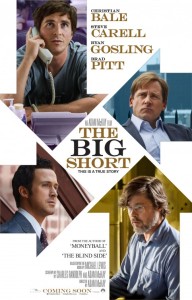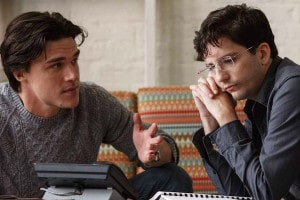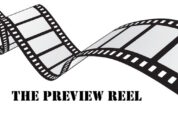Director Adam McKay’s new film, The Big Short, tells the story of a group of outsiders who predicted the credit and housing bubble collapse of the 2000s and how betting on the collapse of the economy led them to some disturbing revelations on the nature of modern banking. The film, based on the best-selling book by Michael Lewis, stars Christian Bale, Steve Carell, Ryan Gosling, Brad Pitt, Jeremy Strong, Rafe Spall, John Magaro, Hamish Linklater, and Finn Witrock.
Two of the film’s stars, Jeremy Strong and John Magaro, play Vinny Daniel and Charlie Gellar, respectively, a couple of the men who attempt to take advantage of the banks’ greed by betting against them. Both actors have been busy in recent years, making appearances in several high profile projects. Strong has had roles in Zero Dark Thirty (2012), The Judge (2014), Selma (2014), and Lincoln (2012) while Magaro has starred in Unbroken (2014) and Not Fade Away (2012).
Strong and Magaro recently spoke with CinemaNerdz about the making of The Big Short, working with Adam McKay, the nuances of playing real-life characters, and making sense out of the senseless and confusing events portrayed in their new film. What follows is a transcript of that conversation.
[divider]
CinemaNerdz: There’s a lot of information in this film that has to get communicated to the audience, what was your experience with this both reading the script and onset trying to make everything palpable to the audience?
JEREMY STRONG: I think my experience was very similar to [John’s]. It was all a discovery for me, and it was really a kind of troubling, unsettling series of discoveries. [Vinnie Daniel], the man I play, described it as a rug getting pulled out from under him; his sort of pillars of faith – financial institutions and Wall Street – getting really undermined by the kind of behavior that he was seeing, reckless, irresponsible behavior; essentially people just making wildly reckless gambles with other people’s money.
To the second part of your question, I heard Dustin Hoffman say this in an interview and I thought it was amazing. Preparing for a movie is like seeing a train a couple miles away in the distance, moving really slow, and coming towards you. The actual making of the movie is the two seconds that it hurls past you in a blur. So, you have to do all your work before you show up.
We had to do a lot of research and homework and try to master the sort of milieu that the movie takes place in and be in command of the language, to try and understand it as best we could. I don’t think any of us really understands the technicalities of these financial concepts in a super detailed way and I don’t think you really have to.
JOHN MAGARO: My initial reaction to the script was an immediate affinity for it; it was so well written, so funny on the page and the characters were so rich and complicated and neurotic and fun, clever and exciting. I was saying this before, but it read like a heist movie, with these bumbling, neurotic anti-hero type characters, I loved it right away. Then, showing up on set after we had done the homework and being fortunate to have great people around to advise us, including Adam Davidson, who used to work for NPR as a financial correspondent and helped us sort of navigate the jargon, as well as our real-life counterparts, who were very supportive and open to sharing as much as they could. Again, going back to the script, you never felt like you had to do much more than say what was there. As long as you knew your lines, you were in pretty good shape.
STRONG: To add to that, there’s a point where an actor’s speaking lines, and I think John’s being modest here, and then there’s a point where they’re speaking lines from a place of understanding and the jargon becomes their language. It shouldn’t be jargon. I think, or hope, that you try as best you can to really understand what you’re talking about so that it will convey a deeper meaning.
CinemaNerdz: Since you both have kind of touched on this, how instrumental were Vinnie Daniel and Charlie Geller with your preparation for these roles?
MAGARO: Adam Davidson put me in contact with Charlie because he had helped him with an NPR show for This American Life called “Giant Pool of Money,” which actually helped Adam McKay actually figure out a way to approach this story. So, Charlie and I Skyped a few times; I would ask questions and he would answer. He came down to New Orleans when we were shooting to visit and we had dinner and he came to the set. He was always open if there was anything I needed. I just had dinner with him a couple nights ago and he’s very pleased with the movie, which, for me personally, is a big win.
STRONG: For me, spending time with Vinnie wasn’t really about getting him to explain and teach me – I had to read a lot of books to do that, I met him before I knew anything so I just pretended to know what he was talking about. I listened to the way he spoke and I watched his behavior and mannerisms and that’s kind of more as an actor what you’re looking for and how you’re trying to bear witness to how that person is and what makes them tick and their idiosyncrasies and behavior. It’s a goldmine when you have a real person that you can spend time with and kind of by osmosis take on their characteristics. I also think it’s a huge responsibility to play a real person because you want to do them justice. You want to portray them in an accurate way and you hope that they’re happy with the way they’re portrayed.
[pullquote_right]Getting those kinds of things are the diamonds that you pray for as an actor.[/pullquote_right]MAGARO: Expanding on that, with Adam, there was a great amount of freedom on set. When we would get to some improv moments, it was nice to have had those conversations with the “real” guys because you really knew what to say and, in fact, the phone call that Charlie has with his mother was never written into the script. It says he’s going to call his mom and it picks up after the phone call is done, but Adam decided to shoot it and thankfully Charlie had laid out that entire conversation for me and I basically just used what he had said to create that scene. Getting those kinds of things are the diamonds that you pray for as an actor.
CinemaNerdz: What was the most challenging part of both of your roles?
STRONG: Each role kind of has its own set of demands. You don’t really know what they are until you start working on it. One of the real challenges of this role was just learning about the world that the movie takes place in and feeling like that language was second nature. That took a lot to get to that place. For me, it was a challenge to sort of take on who Vinnie is. That was something I had never done before. We’re really different people so that was a great challenge in terms of when you get to do a role that really allows you to practice this art form and to try and transform and do that. So that was exciting.

STRONG: Oh yeah, on my very first day, Steve Eisman, the character that Steve Carell plays [named Mark Baum in the film], walked right up to me and said “You look nothing like [Vinnie].”
MAGARO: A real confidence booster.
STRONG: Of course that tells you a lot about who Carell’s character is. He speaks his mind.
MAGARO: Yeah, he speaks his mind. But I have to agree with Jeremy, making the language not be just jargon, making the language have life and passion and stakes behind it. That was probably the biggest challenge.
STRONG: The lines are kind of the last thing you learn. Hopefully the lines are sitting on top of a whole reservoir of other stuff and then the lines just kind of float on that. But you have to own all the rest of it first.
CinemaNerdz: So John, you were in Unbroken, and Jeremy did Lincoln, Zero Dark Thirty, and Selma, so you’ve got true stories…
STRONG: Oh, I thought you were gonna say, you’ve got some heavyweights.
CinemaNerdz: That goes without saying. Those were all true stories, but those were all serious subjects and while The Big Short is also a serious subject, Adam McKay found a way to make it entertaining, without over dramatizing the seriousness of it. How did you find his unique approach?
[pullquote_right]I think it’s a really serious film that kind of is like a swift kick in the gut.[/pullquote_right]MAGARO: I found it really refreshing. As a lover of film, even if I wasn’t part of this, I think I would love this film. It’s a new approach that, you could say other things are like it, but I don’t know if there’s anything that is close to it. I think he’s sort of inventing something new here, like a docu-comedy-drama-frenetic-pop culture thing. Because of that, it made it very different and exciting.
STRONG: I love that question, because I actually put this film in the same category as those films. I was really blown away by the movie. I didn’t know what to expect, and I think the movie is really inspired and personal. But I think that even though it’s a humorous movie, it’s every ounce as serious as those other movies. I remember on the set of Lincoln there was a day when Steven Spielberg and Tony Kushner were saying, “Gee, I hope people are going to be interested in a movie about the legislative process.” Because, essentially Lincoln is a movie about a kind of arcane subject and The Big Short is about mortgage backed securities and while it has a real kind of buoyancy and fun and whimsy and imagination to it, I think it’s a really serious film that kind of is like a swift kick in the gut.
[divider]
See Jeremy Strong and John Magaro in The Big Short in theaters on Wednesday, December 23, 2015!







